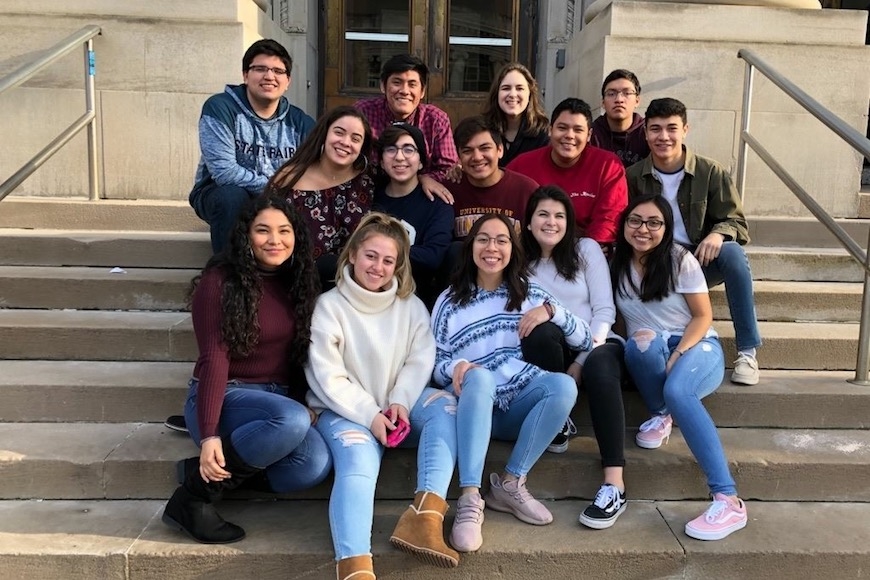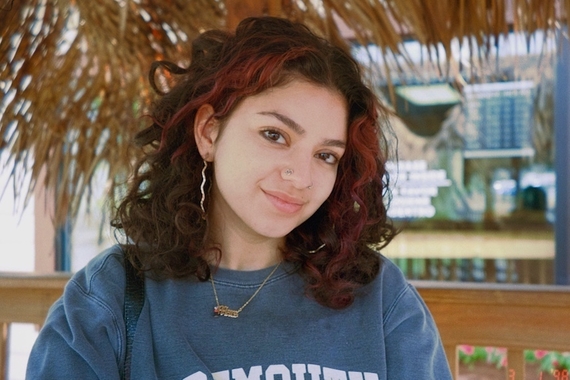Living & Learning in CASA SOL
On-campus Living Learning Communities (LLC) provide participants with a unique opportunity: to connect with fellow students who have shared interests or backgrounds, work closely with University faculty and staff, and lay the foundation for the remainder of their collegiate career. For an institution like the University of Minnesota, this is invaluable. With 29,819 undergraduate students enrolled in spring 2019, it can be overwhelming for first-year students to define a solid on-campus support system. CASA SOL provides Latinx and Chicana/o/x first-year and transfer students a reliable community within the broader University.
CASA SOL: A Family
CASA SOL—which stands for community activism, student achievement, and student opportunities for leadership—was founded in 2005 with the intention of providing a place to academically, socially, and culturally support first-year students interested in the Chicano & Latino studies (CLS) department. Students in the LLC, called Solerxs, are paired with program alumni, who serve as peer mentors, and also work closely with faculty and staff. For example, the faculty hosts un cafecito, little coffee breaks for Solerxs, which allow them to connect, hang out, and begin building a campus community. Additionally, the CASA SOL planning committee, a team of staff and faculty who provide leadership and mentorship to the students, includes an advisor who guides students’ academic and extracurricular goals. The planning committee also hosts and attends weekly study nights.
Lisa Sass Zaragoza, programs and outreach coordinator for CLS and member of the planning committee for CASA SOL, works to create strong bonds between the students. “CASA SOL facilitates family,” Sass Zaragoza says. “There is a general sense of community within the group… a desire and goal to maintain a relationship with identity and understand what it means to be Latinx.”
Solerxs form a bond by taking classes, living in the residence halls, and attending multiple retreats together. In particular, the beginning-of-the-year retreat helps them acclimate to their new lives as college students while encouraging lasting relationships built on mutual interest and personal backgrounds. Each fall, an off-campus YMCA camp hosts this day-long retreat. Students participate in group-bonding activities facilitated by YMCA personnel and engage in CASA SOL- and Latinx-centered activities and discussions. The retreat is a highlight for students, who report that they particularly enjoy the discussions on group and cultural values and norms, hopes, and dreams.
CASA SOL students take two classes together each year. Assistant Professor Gabriela Spears-Rico taught the fall 2018 semester freshman seminar called Performing Latina/o/x Identities: Media, Art, and Popular Culture. This seminar critically engaged with Latina and Latino representation in the media and how Latinas and Latinos represent themselves in mainstream, independent, and social media. Students learned to identify major representative tropes of Latinos in television, film, print, and news media. Department Chair Karen Mary Davalos will teach the seminar on Food and Culture in fall 2019.
In the spring, Solerxs take a class in CLS that supports their leadership development. Community Engaged Learning allows students to collaborate with a CLS partner organization, such as Academia Cesar Chavez, a bilingual-bicultural charter school, and take their knowledge into the community beyond the University. Solerxs taught a mini-class to the eighth graders and then organized a campus visit for those same eighth graders. They also worked with youth and families at El Colegio High School and Hiawatha Academies, both in south Minneapolis. At El Colegio they were responsible for various aspects of an annual art auction and scholarship fundraiser event and at Hiawatha Academies, they met with fifth graders to share their educational journey as Latinx students, now in college. In the process, they examined their own racial and ethnic identity and its overlap with the formal educational system.
Alumni
Juan Telles is another committee member, and his job is to facilitate events and workshops during the school year. He helps recruit during the summer as well as plan the fall and spring retreats.
“One thing I do take on myself is meeting with potential students and their families at various admissions events… It is very important to involve the families,” Telles says. “I know there are several students who are still connected to their CASA SOL peers, even years after they have all graduated and moved on with their lives. It is such an inspiring thing to see!”
Telles says that staff and faculty gain insight into what recent high school graduates are going through. This insight helps them better understand what it takes to retain and graduate Latinx and Chicana/o/x students.
“Our students still have significant family and outside-of-the-institution responsibilities,” says Telles. “We have more students who cannot afford to live on campus, so it’s up to us to find ways to make sure commuter students can still participate. We enjoy learning from them as much as they learn from us.”
Shanel Perez graduated in 2016 with a double major in business-marketing education and human-resources development. She discovered CASA SOL during her freshman orientation when she inquired about opportunities for Latinx students on campus.
CASA SOL helped Perez combine her academic pursuits with her personal curiosity about Latinx history in the United States. “My CASA SOL experience was the first time I could control what I wanted to learn,” says Perez. “I learned that I can make my education what I want it to look like.”
Perez says her key takeaway from CASA SOL was realizing how diverse the Latinx and Chicana/o/x experience is in terms of personal experiences, identities, and backgrounds. Through the shared classes and retreats, Perez built deeper relationships with fellow Latinx and Chicana/o/x students. “I got exposed to how beautiful of a culture and people we are," she says.
The Bottom Line
From interacting with peers who share interests and personal goals to mentorships and frequent interaction with faculty and staff, Living Learning Communities provide invaluable experiences. CASA SOL is unique in the realm of LLCs because of their addition of commuter students, and this makes their program vital to the college experience for those affiliated with CLS.
This story was written by an undergraduate student in CLAgency. Meet the team.


